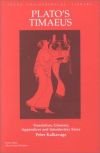
Timaeus is one of Plato's dialogues, mostly in the form of a long monologue given by the titular character, written circa 360 BC. The work puts forward speculation on the nature of the physical world and human beings and is followed by the dialogue Critias. Participants in the dialogue include Socrates, Timaeus of …

Parmenides is one of the dialogues of Plato. It is widely considered to be one of the more, if not the most, challenging and enigmatic of Plato's dialogues. The Parmenides purports to be an account of a meeting between the two great philosophers of the Eleatic school, Parmenides and Zeno of Elea, and a young Socrates. …

Hippias Minor, or On Lying, is thought to be one of Plato's early works. Socrates matches wits with an arrogant polymath who is also a smug literary critic. Hippias believes that Homer can be taken at face value, and that Achilles may be believed when he says he hates liars, whereas Odysseus' resourceful behavior …

The Theaetetus is one of Plato's dialogues concerning the nature of knowledge, written circa 369 BC. In this dialogue, Socrates and Theaetetus discuss three definitions of knowledge: knowledge as nothing but perception, knowledge as true judgement, and, finally, knowledge as a true judgement with an account. Each of …

Taking the form of a dialogue between Socrates, Gorgias, Polus and Callicles, GORGIAS debates perennial questions about the nature of government and those who aspire to public office. Are high moral standards essential or should we give our preference to the pragmatist who gets things done or negotiates successfully? …

 English
English Español
Español Deutsch
Deutsch

